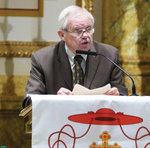


Cardinal Avery Dulles, S.J., son of a prominent American Protestant family, converted to Catholicism and became a Jesuit, a priest and the leading U.S. theologian of his time. This year marks the centennial of his birth, and St. Joseph’s Seminary, Dunwoodie, held a celebration Oct. 28 of his life and work.
Cardinal Dulles taught theology as the Laurence J. McGinley Professor of Religion and Society at Fordham University, 1988-2008. At St. Joseph’s Seminary he was scholar in residence, 1996-1997, and an adjunct professor, 2002-2007. He also taught at Woodstock College and The Catholic University of America. The author of 23 books and some 800 articles, he was made a cardinal in 2001. He died in 2008 at age 90.
Msgr. Peter I. Vaccari, rector of St. Joseph’s Seminary, commenting in an interview on Cardinal Dulles’ legacy, said, “Who he was as a priest and a theologian is important in a house of formation” where seminarians and diaconal candidates prepare to live their vocations.
Msgr. Vaccari quoted 1 Peter 3:15: “Always be ready to give an explanation to anyone who asks you for a reason for your hope.”
“Cardinal Dulles modeled that for us,” he said. “We are people of hope…His vocation called us to want to pursue the depth of our faith, to use our reason, to use the gifts that God has given us.” Cardinal Dulles’ approach to priesthood and theology, he said, wove together “the four dimensions of formation: human, spiritual, intellectual and pastoral.”
Father Kevin O’Reilly has been academic dean at Dunwoodie since 2006. “It was such a privilege to have such a brilliant mind teaching for us, and you could see that the seminarians really appreciated it,” Father O’Reilly said. “My interactions with the cardinal were connected with what courses he would teach. He was extremely gracious and willing to help with whatever we needed.” He added that Cardinal Dulles asked him about his doctoral research and made some suggestions.
“He was just so kind and gracious to listen to a struggling graduate student working on his dissertation,” Father O’Reilly said.
The main speakers at the event were Dr. Patrick W. Carey, professor emeritus of theology at Marquette University, and Auxiliary Bishop James Massa of the Diocese of Brooklyn. Dr. Carey is the author of a biography, “Avery Cardinal Dulles, S.J., A Model Theologian.” Bishop Massa holds a doctorate in systematic theology from Fordham University and wrote his dissertation under Cardinal Dulles.
The event began with Mass. Bishop Massa presided; the homilist was Father Matt Malone, S.J., president and editor in chief of America magazine.
Dr. Carey spoke about Cardinal Dulles’ theology of faith. He said that the cardinal’s book “The Assurance of Things Hoped For: A Theology of Christian Faith,” is “his most mature theological work and a major theological contribution in the English-speaking world.”
“The topic of faith,” he said, “needs considerable attention today when significant numbers of Catholics have either abandoned the faith or are drifting away from it.”
He spoke of the faith journey that brought Avery Dulles, then a student at Harvard University, into the Catholic Church.
“Dulles was attracted to the Catholic way of life by his study, his search for meaning, and his contacts with Catholics,” Carey said, “but these favorable instances did not relieve him of his lingering doubts about Catholicism…His decision to become a Catholic, as he himself indicated, was an act of faith and trust in God.”
Carey quoted from a homily the cardinal preached to students at the University of Wisconsin in Madison. The day’s Gospel focused on the Apostle Thomas after the Resurrection.
“In every generation the faith has to be rediscovered,” Cardinal Dulles said. “The modern Church recapitulates the experiences of the early Church…The Apostle Thomas had personal doubts not unlike the ones that we experience from time to time. But he was sustained by his contact with his fellow Apostles, who enabled him to have a direct encounter with the risen Jesus, and then to make a firm and unreserved profession of faith. The stages in the conversion of Thomas from a doubted to a committed believer can be a model for you and me.”
Bishop Massa, in his talk, asked, “What is more foundational to the study of theology than the act of faith and the contents of the faith that is professed and passed on?”
He noted the difference between believing in God and believing the Church (not in the Church). He quoted Origen’s words that the Church is not God, but “his footstool”; “she remains at the Lord’s feet and washes them with her tears.”
“There have been plenty of tears lately in the Church,” he continued. “The recent disclosures of historical cases of sexual abuse and their mishandling by bishops, along with investigations by civil authorities into possible criminal activity associated with the cases, have greatly unsettled many of the Church’s members.”
He added, “In our preaching and catechesis, we must make clear that the Church may be divinely founded and guided, but she is not divine…the Church is sometimes wrong and sometimes notoriously sinful in her members. All her strength, all her light comes from the One whom Jesus promised would always abide in her, the Holy Spirit.”
Participating in a panel discussion were Dr. Carey; Bishop Massa; Father Robert Imbelli, adjunct professor of dogmatic theology at Dunwoodie; Father Malone; and Sister Anne-Marie Kirmse, O.P., who worked with Cardinal Dulles for 20 years as his assistant.
Sister Anne-Marie told CNY that Cardinal Dulles was “very kind, considerate and humble.” She said that when he talked on the phone, it was impossible to know whether he was speaking with a politician, a Church leader, a relative or a member of the custodial staff. “He treated each personal equally and with dignity,” she said.